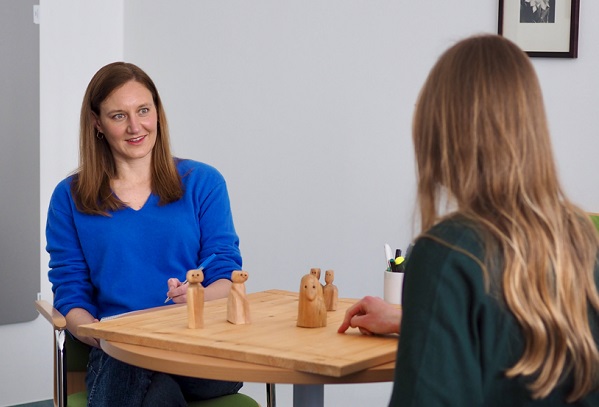Students can take advantage of psychological counseling free of charge, regardless of the problem or when experiencing anxiety.

A war broke out in Ukraine just a few weeks ago, confronting us with real-time images of war that are not only frightening but also a source of distress and worry. The close proximity to Ukraine and the immediacy of the situation makes it difficult at times to look into the future with optimism and promise. To help cope with the situation, the Office of Student Psychological Counseling has put together some tips and advice:
Fear is normal – and we should be talking about it!
While the war in Ukraine is currently bringing feelings of fear, despair, helplessness, and even anger, to the surface, it is also important to remember that these feelings are not only common and normal, but they are also a healthy, biological responses designed to help us quickly understand situations and find a way to deal with them and respond. Try not to suppress or deny these types of feelings: all different kinds of feelings are okay. It is important, however, to try and not to feel like you are all alone. Talk about how you are feeling and you will most likely discover that many of our friends, family, others you know probably feel the same way! Together, you can often address and overcome stressful situations better.
Information can give you a sense of security – but in moderation!
When getting your daily news, focus on just a few, trustworthy media sources. Once nothing more is ‘new’ and the media starts repeating news stories and images and it begins to feel like it’s all getting too overwhelming, switch it off. We all need a break from a constant barrage of information.
Another way to keep from feeling too overwhelmed is limiting your media time to just 1-2 times a day and for a set period of time. This will allow you to stay up-to-date but without sinking into a vortex of negative news. If this is too difficult, perhaps try it a different way by setting periods throughout the day in which you stay away from the news and other media, thereby taking some ‘time off’ from the negative news.
Perhaps also try just listening to the news instead of watching it on TV or on one of your devices.
Create your own safe space and plan the day well!
In these and other types of situations, there is a great need to feel safe and experience a sense of normalcy, such as your everyday routine. Think about what is best for you personally and incorporate these activities as you go about your day. Allow yourself to do what you enjoy, even in times of crisis. Some people find comfort in hugs, or just cuddling and petting their cat, dog, or other pets. Others find strength in more familiar hobbies, such as exercising, spending time outdoors, playing an instrument, listening to music, or writing, just to name a few.
Getting involved – what can I do to help?
You can overcome some of your fear and feelings of helplessness by getting actively involved and seeing where you can be of help. Some people, for example, take part in peace demonstrations or donate money. There are a number of initiatives where people are asking for support. Offer to talk with - or listen to - others who need someone to lend an ear. Is there someone else you know who is having a tough time with the current situation and would appreciate talking about it with you? SOS Mitmensch, for example, offers options to get involved, such as Ukraine: Ukraine: What can I do? Where can I help? (sosmitmensch.at), opens an external URL in a new window
Where can I find help when it all gets to be too much?
If you start feeling like it’s all getting to be too much, seek out help by contacting the Office of Student Psychological Counseling (https://www.studierendenberatung.at/, opens an external URL in a new window 0732/2468-7930), a crisis hotline, such as Crisis Help (https://www.krisenhilfeooe.at/, opens an external URL in a new window, or call 0732/2177 any time of the day or night), or the BÖP-Helpline (01/ 504 8000, helpline@psychologiehilft.at). Experts are on hand to help you address your mental health and cope with difficult situations and anxiety in the best way possible.
Services at the Office of Student Psychological Counseling are available free of charge and can help you address other issues, such as stress on account of exams, general insomnia, etc. The earlier you seek help, the better!
Contact
The Office of Student Psychologiscal Counseling Linz
Hochschulfond Bldg., 1st floor, Altenbergerstraße 69, 4040 Linz
Ph: 0732 2468 7930; E-mail: psychol.studber(at)jku.at
https://www.studierendenberatung.at/standorte/linz, opens an external URL in a new window








